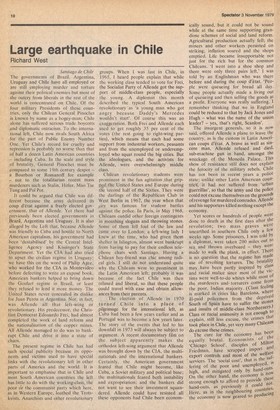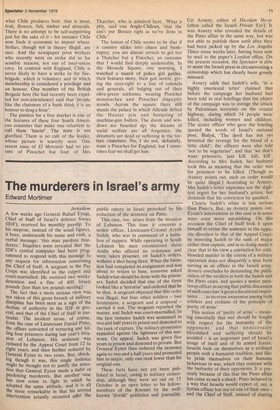Large earthquake in Chile
Richard West
Santiago de Chile The governments of Brazil, Argentina, Uruguay and Chile have all employed or are still employing murder and torture against their political enemies but most of the outcry from liberals in the rest of the world is concentrated on Chile. Of the four military Presidents of these countries, only the Chilean General Pinochet is known by name as a bogey-man; Chile alone has suffered serious trade boycotts and diplomatic ostracism. To the international left, Chile now rivals South Africa for the part of Public Enemy Number One. Yet Chile's record for cruelty and repression is probably no worse than that of half a dozen Latin American countries — including Cuba. In the scale and style . of brutality, General Pinochet must be compared to some 19th eentury despot — a Bourbon or Romanoff for example 7" not to the totalitarian recent mass murderers such as Stalin, Hitler, Mao Tse Tung and Pol Pot.
It could be argued that Chile was dif ferent because the army delivered its coup d'etat against a freely elected government, that of Allende. Yet there had previously been elected governments in Brazil, Argentina and Uruguay. It is also alleged by the Left that, because Allende was friendly to Cuba and hostile to North American capitalism, his government had been `destabilised' by the Central Intelligence Agency and Kiesinger's State Department. Yet the CIA had also tried to upset the civilian regime in Uruguay; we have this on the word of Philip Agee, who worked for the CIA in Montevideo before defecting to write an expose book. American bankers helped to bring down the Goulart regime in Brazil, or least they refused to lend it more money. The United States never concealed its dislike for Juan Perdn in Argentina. Nor, in tact, was Allende all that left-wing or revolutionary. His predecessor, the Christian Democrat Edouard° Frei, had almost completed the work of land reform and the nationalisation of the copper mines. All Allende managed to do was to bankrupt Chile and drive it into a state of chaos.
The present regime in Chile has had such special publicity because its opponents and victims used to have special links with the revolutionary left in other parts of America and the world. It is important to emphasise that in Chile and most South American countries the left has little to do with the working-class, the poor cir the communist party which here, as in Western Europe, loathed the Trotskvists. Anarchists and other revolutionary groups. When I was last in Chile, in 1965, I heard people explain that while the working class tended to vote for Frei, the Socialist Party of Allende got the support of middle-class people, especially the young. A diplomat this month described the typical South American revolutionary as `a young man who got angry because Daddy's Mercedes wouldn't start'. Of course this was an exaggeration. Both Frei and Allende each used to get roughly 35 per cent of the votes (the rest going to right-wing parties), which means that each had some support from industrial workers, peasants and from the unemployed or underemployed who squat round the big cities. But the ideologues, and the activists for Allende, were overwhelmingly middle class.
Chilean revolutionary students were prominent in the fun agitation .that gripped the United States and Europe during the second half of the Sixties. They were the darlings of the Republican Club in West Berlin in 1967, the year when that city was famous for student battles against the police. In Paris, in May 1968, Chileans outdid other foreign contingents in mouthing slogans and throwing stones. Some of them fell foul of the law and came over to London; a left-wing lady I knew at the time, who had given them shelter in Islington, almost went bankrupt from having to pay for their endless telephone chats with Santiago. Having a Chilean boy-friend was chic among radical girls. I still do not understand quite why the Chileans were so prominent in the Latin American left; probably it was because of the fact Chile was then relaxed and liberal, so that these people could travel with ease and obtain allowances from their parents.
The election of Allende in 1970 turned Chile into a place of pilgrimage for the international left, as Cuba had been a few years earlier and as Portugal was to become a few years later. The story of the events that led to his downfall in 1973 will always be subject to argument. A recent documentary film on the subject apparently makes the orthodox left-wing argument that Allende was brought down by the CIA, the multinationals and the international bankers. Certainly, the American government feared that Chile might become, like Cuba, a Soviet military and political base; the multinationals feared both instability and expropriation; and the bankers did not Want to see their investment squandered. Allende could have resisted all these opponents had Chile been econom ically sound, but it could not be sound while at the same time supporting gran diose schemes of social and land reform.
Agricultural production actually fell; the miners and other workers persisted on striking; inflation soared and the shops emptied. Life became insupportable not just for the rich but for the common Chileans. `I went into a shoe shop and there were only three pairs left,' I was told by an Englishman who was there before and during the coup d'etat. 'Peo ple were queueing for bread all day. Some people actually made a living out of queueing and then selling the goods at a profit. Everyone was really suffering. I remember thinking that we in England could be reduced to that by Jack Jones and Hugh — what was the name of the union leader? — yes, that's right, Scanlon'.
The insurgent generals, so it is now said, offered Allende a plane to leave the country, as is the custom in Latin Ameri can coups d'etat. A brave as well as sincere man, Allende refused and died, sub-machine gun in hand, amongst the wreckage of the Moneda Palace. This show of resistance still does not explain the ferocity of the military rebels. Chile has not been in recent years a police state; unlike other Latin American coun tries, it had not suffered from `urban guerrillas', so that the army and the police could not excuse themselves on the grounds of revenge for murdered comrades. Allende and his supporters killed nothing except the economy.
Yet scores or hundreds of people were done to death in the first days after the revolution; two mass graves were unearthed in ,southern Chile only a few weeks ago. Some prisoners, I was told by a diplomat, were taken 200 miles out to sea and thrown overboard — they were made to walk the plank, in effect. There is no question that the regime has made use of revolting tortures. The brutality may have been partly inspired by class and racial malice since most of the vic tims were well-to-do whites while most of the murderers and. torturers come from the poor, Indian majority. (Class feeling is marked in cities like Barelona, where, ill-paid policemen from the depriveu South of Spain have to suffer the stones and insults of middle-class Northerners.) Class or racial animosity is not enough to explain, still less excuse, the crimes that took place in Chile, yet very many Chileans do excuse these crimes. The cure for the economy has been equally brutal. Economists Of the `Chicago School', disciples of Milton. Friedman, have scrapped import and export controls and most of the welfar,e_ services. The `social cost', that is the stir tering of the poor and unemployed, is high, and mitigated only by hand-outs. On the other hand, the economy is now strong enough to afford to provide thes hand-outs, as previously it could no Here, as in the neighbouring countries, the economy is now geared to producing what Chile produces best: that is meat, fruit, flowers, fish, timber and minerals. There is no attempt to be self-supporting just for the sake of it — for instance Chile now finds it economic to import wheat. Strikes, though not in theory illegal, are rare. And the newspaper print workers who recently went on strike did so for sensible reasons, not out of inter-union envy. In contrast with England, Chile is never likely to have a strike in the firebrigade, which is voluntary and in which membership is considered a privilege and an honour. One member of the British Brigade here (he had recently been expelled for non-attendance) said that 'people like the chairman of a bank think it is an honour to drag a hose'.
The passion for a free market is one of the features of these four South American countries that make one reluctant to call them 'fascist'. The state is not glorified. There is no cult of the leader, whose picture is scarcely seen. One recent issue of El Mercurio had no picture of Pinochet but four of Mrs Thatcher, who is admired here. 'What a pity, said one Anglo-Chilean, 'that she can't put Britain right as we've done in Chile'.
The lesson of Chile seems to be that if a country slides into chaos and bankruptcy, you are almost certain to get not a Thatcher but a Pinochet, an outcome that I would find deeply undesirable. In the Moneda Square, one morning, I watched a march of police girl guides, their features stony, their gait severe, giving the eyes-right to a line of colonels and generals, all bulging out of their olive-green uniforms, wearing Pinochet moustaches and Pinochet dispeptic scowls. Across the square there still stands the palace in which Allende defied the Hunter jets and battering of machine-gun bullets. The doors and windows are boarded up; the dreams of social welfare are all forgotten; the dreamers are dead or suffering in the torture chambers. No, I do not, definitely, want a Pinoc het for England, but I sometimes fear we shall get him.



































 Previous page
Previous page